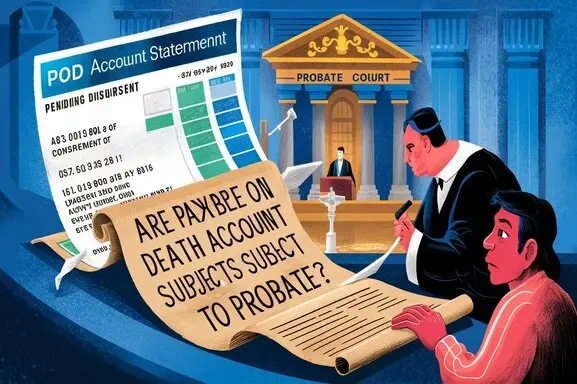Are Payable On Death Accounts Subject To Probate?

A POD, or payable on death, account is a unique type of account whereby you can name a beneficiary who will inherit the assets of the account after your death. A major issue is, nevertheless, whether POD accounts need to be filed via probate upon death. This is what you should know.
Probate is what?
Let's first define probate. Following a death, probate is the legal process used to handle the authenticity of a will, property recovery, liability and tax payment processing, and property distribution among the beneficiaries. Should the person pass on the opposite side with a will, they go through a testate probate. Intestate probate is the result of dying without a will.
Although state laws vary, generally probate entails submitting documentation to the probate court, notifying creditors of the death, obtaining asset evaluations, handling other claims, and distributing the remaining property to beneficiaries as specified by the will or under the laws of the state should there be no will.
Particularly for tiny estates or when little assets pass through the process, probate can be rather simple. Of course, it also has disadvantages; it is often expensive, and everyone has access to the material; moreover, it might take more than a year to finish.
POD Account: Reasons for Selection
From here we start to wonder why POD accounts are useful in general. POD accounts have one of the biggest benefits in that assets may be transferred to a beneficiary right away upon the death of the original owner and without involving legal procedures. The kind of assets have beneficiaries already linked to them, which helps the heirs save time and money in probate.
Checking Accounts Payable, deposit accounts, CD accounts, investment accounts, and savings bonds are among the most often seen accounts typically assigned POD designations. These are stories where you name someone as the payable-on-death beneficiary and the money flows to that individual upon your death. The accounts themselves are practically bypassing probate since the POD directs assets straight to beneficiaries.
What happens should POD accounts funded by probate pass through probate?
Although POD accounts are meant to avoid probate, occasionally a payable-on-death account could nevertheless go through probate:
Should none of the beneficiaries survive you? Generally, should there be no valid will, the account would probably have to be probated and dispersed according to the rules of the state should all the beneficiaries you have identified in your POD documents die before you.
Problems with validity: Should someone contend that you were not valid when signing the will or that some of the POD beneficiary changes were improper, this could set up a court dispute putting the accounts under probate.
Accounts may be drawn up if creditors claim against the estate that cannot be handled without probating the will.
If your liabilities exceed your assets, the executor is probably going to settle your debts using the POD account money in the probate estate.
Must pay bills; the executor may seek to have the POD accounts added to provide money for the burial, medical and other connected expenses, taxes, and various charges incidental to estate administration.
Therefore, even while POD accounts by themselves do not always call for the probate procedure, some unique circumstances can cause them to be drawn in, especially about an insolvent estate or some other disputes.
Different Methodologies for Using POD Accounts
Here is some advice if you wish to use POD accounts especially to avoid probate:
Should the original beneficiary die before the policyholder, you should list contingent beneficiaries.
Your PODs should change as your tastes change with time.
See an estate planning attorney if you have a challenging estate matter to help you.
Make sure you leave clear written proof of your intentions and desired distribution of the accounts.
Make sure there are enough other real assets to cover taxes, fees, and other expenses so POD accounts can be quickly moved from one bank to the next.
The Finish Line
Generally speaking, payable-on-death accounts can be a good way for most people who wish to have them formed correctly to transfer particular property to beneficiaries without involving probate. You should be aware, though, that in certain cases—should there be any estate dispute—POD accounts could find themselves in the probate. An estate planning lawyer can assist you in creating strategies that would permit the effective implementation of your testament instructions.
Contact us here for Accounting services now!

